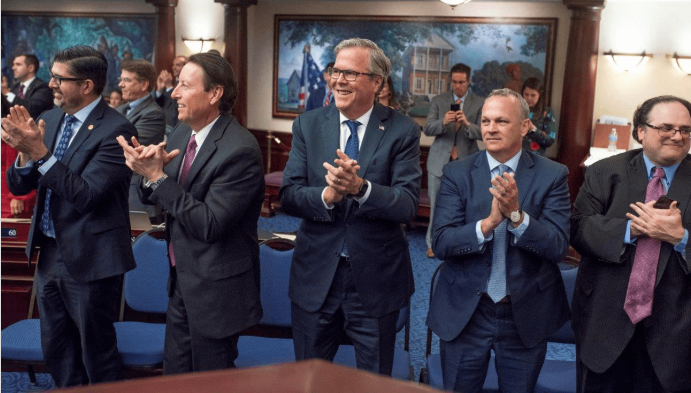
Twenty years ago, on June 13, 2001, Gov. Jeb Bush signed HB 21, a taxation relief bill that carried within it Florida’s third private school scholarship program. The program, then called the Florida Corporate Income Tax Credit Scholarship, would enroll its first students in the spring of 2002 and would grow to award more than 1 million scholarships by 2021.
But the Florida Tax Credit Scholarship was not destined to become the nation’s largest private school scholarship of its kind. In fact, it almost didn’t happen.
The bill carrying the program, SB 1048, was nearly killed on the second day of the legislative session. Politics, budget pressures, competing voucher ideas, the need to overhaul Florida’s election system after the debacle of the 2000 presidential election, and an anti-scholarship lawsuit looming overhead, meant the new scholarship’s future was far from certain.
The scholarship program was introduced under companion bills HB 271, sponsored by then-freshman Rep. Joe Negron (R-Stuart), and SB 1048, sponsored by Sen. Ken Pruitt (R-Port St. Lucie). Both versions allowed corporations to earn a dollar-for-dollar tax credit when donating to low-income scholarships.
The House version limited corporate donations to 75% of the taxes due but otherwise did not cap the total available tax credits. The Senate’s bill capped the program at $50 million in available tax credits and limited corporate donors to $200,000 in total tax credits annually.
The House version offered scholarships worth up to $4,000 for private school students, $1,000 for home education students, and $500 to cover transportation costs for students wishing to attend out-of-district public schools. The Senate’s bill offered no scholarships for home education, while the private school scholarship was worth $3,500. The public-school transportation scholarship remained the same.
Florida was spending $7,512 per pupil in public schools at the time according to the U.S. Department of Education.
Both bills limited scholarships to the more than 1 million students who were eligible for the National School Lunch Program, a federally assisted meal program operating in public and nonprofit private schools and residential childcare institutions.
School choice advocates quickly organized the handful of existing scholarship parents to meet with legislators, a move that put Democrats in a tough spot publicly.
“I personally resent the parading of Black parents through the halls of this Legislature and holding them up as examples of people who will receive vouchers,” Rep. Frederica Wilson (D-Miami) fired back. “I personally resent the stereotype.”[1]
But it was no stereotype.
 Those “parading” about the halls of the Legislature were parents of the 51 students on the Opportunity Scholarship in 2001, a program that offered scholarships to students attending public schools the state had given a letter grade of F. At the time, only students attending two high-poverty elementary schools in the entire state qualified, and most of those students happened to be Black.
Those “parading” about the halls of the Legislature were parents of the 51 students on the Opportunity Scholarship in 2001, a program that offered scholarships to students attending public schools the state had given a letter grade of F. At the time, only students attending two high-poverty elementary schools in the entire state qualified, and most of those students happened to be Black.
The House moved swiftly before passing the bill 71-46 on March 8.
The Senate’s bill did not fare as well.
It nearly met disaster in the Senate Education Committee on March 7. Two Republicans, Sen. Alex Diaz de la Portilla of Miami and Sen. Donald Sullivan of Seminole, joined Democrats to vote down the scholarship bill 8-5.
Diaz de La Portilla argued the bill was “poorly written,” and cited confusion as to whether corporate donors could earn tax credits by buying books rather than funding private scholarships.[2]
Sullivan, however, would provide a way forward by moving to reconsider the vote, which according to the Associated Press, was “a procedural move that kept the bill alive.”[3]
The Senate’s scholarship bill would re-emerge in the Senate Education Committee on March 13, where it passed on a party line vote. It reached the Senate Finance and Taxation Committee on March 28 and again scraped by on a party line vote.
Despite passing in the House weeks before, the senate’s companion bill would linger on life support in the Appropriations Subcommittee on Education. By April 11, the bill was dead.
During this time, the Legislature had been negotiating with Bush over his priorities, which included eliminating the intangibles tax and $300 million in tax cuts.
Senators were unsure of where the money might come from. The proposed voucher programs could cost around $50 million or more, while fixing the electoral system could cost another $40 million. Other spending priorities also competed for tax dollars.
“The last couple of years it has sort of been his way or the highway,” Sen. Jim King told the Associated Press about the legislature’s relationship with the governor.[4]
Something would have to give.
The Legislature had been working on two other voucher bills, the smaller of which garnered the most attention and criticism. HB 303 and its Senate companion, SB 504, would create $3,000 private school scholarships for students attending overcrowded public schools.
Bill sponsor Rep. Carlos Lacasa (R-Miami) argued the program was necessary to relieve crowding because the state’s spending of $8.5 billion on school construction had failed to remedy the situation.[5]
An estimated 40,000 to 235,000 students would be eligible — a fraction of those eligible under the tax credit scholarship bill.
“Here we see the main character, Hannibal Voucher, attempting to cannibalize our public school system,” Rep. Bob Henriquez (D-Tampa) said of the bill.[6]
Columnist Daniel Ruth called it the “Gutting Public School System Act.”[7]
Wilson, the representative from Miami, predicted public schools would still be struggling in five years, while Rep. Eleanor Sobel (D-Hollywood) argued it would be helping mostly children from well-off families.[8]
HB 303 passed the House 63-54 on March 21, 2001, but Senate President John McKay and Senate Education Committee Chair Pruitt had no intentions of moving the bill forward. The tax credit scholarship faced criticism too.
“The tax credit bill is a gimmick to get around potential constitutional pitfalls for existing voucher programs,” said Rep. Lois Frankel (D-West Palm Beach). “It’s very clever and very scary.”
“I don’t feel that taking money out of public schools is right,” said Sen. Ron Klein (D-Delray Beach), who sent his own children to private schools.
According to a Tampa Tribune survey at the time, legislative Democrats were more likely than Republicans (32% to 27%) to send their own children to private schools.[9]
By April 24, the specter of a voucher defeat in the Florida Supreme Court passed as the justices declined to hear the case and allowed the October 2000 First District Court of Appeal ruling to stand. That ruling declared the Opportunity Scholarship program did not violate the state’s “paramount duty” to fund public schools.
However, the tax credit scholarship still had no active bill in the Senate.
On May 4, during the waning hours in the last day of the 2001 session, Pruitt filed an amendment to HB 21, a bill that eliminated the intangibles tax, a priority of Bush. The amendment included a $50 million tax credit scholarship program with scholarships worth up to $3,500. The bill passed 25-14 at 8:30 p.m.
As the midnight deadline ticked closer, the bill was sent to the House, where it passed 72-44 at 9:45 p.m.
Bush would fulfill his promise to eliminate the intangibles tax and get $175 million in tax cuts — and Florida would get a new tax credit scholarship program. Two decades later, the program would raise more than $4 billion to fund more than one million scholarships for low-income and working-class students.
It is a success that has never been duplicated by any other state — and one that almost didn’t happen.
[1] Staff Writer. (March 9, 2001). School vouchers lawmaker says blacks are being stereotyped. Miami Herald.
[2] Twiddy, D. (March 7, 2001). Panel Rejects GOP Voucher Bill. Tallahassee Democrat.
[3] Staff Writer. (March 7, 2001). Bush’s priorities seem in jeopardy from start. Associated Press/Bradenton Herald.
[4] Kallestad, B. (March 6, 2001). Tax cut, vouchers and election reform agreement far away. Associated Press.
[5] Kleindienst, L. (February 21, 2001). Key house committee Oks voucher bill; foes said measure would let students avoid the state assessment test that public-school students take. Orlando Sentinel. See also, Hegarty, S. (March 18, 2001). Lawmakers debate 2 new voucher bills. St. Petersburg Times.
[6] Staff Writer. (February 10, 2001). House Democrats criticize school voucher plan. Florida Times-Union.
[7] Ruth, D. (February 9, 2001). A voucher is a voucher is a… Tampa Tribune.
[8] Hallifax, J. (March 22, 2001). Debate on the floor. Tallahassee Democrat.
[9] Feller, B. (April 10, 2001). Voucher views based on beliefs. Tampa Tribune.



[…] ago, I had the privilege of signing the Florida Tax Credit Scholarship bill into law and today, more than a million Florida students have received scholarships to attend a school of their choice. Over the years, […]
[…] ago, I had the privilege of signing the Florida Tax Credit Scholarship bill into law and today, more than a million Florida students have received scholarships to attend a school of their choice. Over the years, […]
[…] years ago I Sign a Florida Tax Credit Scholarship Bill and today Over a million Florida students are receiving scholarships to attend the school of their choice. Over the years, I […]
[…] ago, I had the privilege of signing the Florida Tax Credit Scholarship bill into law and today, more than a million Florida students have received scholarships to attend a school of their choice. Over the years, […]
[…] I had the privilege of signing the Florida Tax Credit Scholarship bill into law and today, more than a million Florida students have received scholarships to attend a school of their choice. Over the years, […]
[…] I had the privilege of signing the Florida Tax Credit Scholarship bill into law and today, more than a million Florida students have received scholarships to attend a school of their choice. Over the years, […]
[…] ago, I had the privilege of signing the Florida Tax Credit Scholarship bill into law and today, more than a million Florida students have received scholarships to attend a school of their choice. Over the years, […]
[…] ago, I had the privilege of signing the Florida Tax Credit Scholarship bill into law and today, more than a million Florida students have received scholarships to attend a school of their choice. Over the years, […]
[…] I had the privilege of signing the Florida Tax Credit Scholarship bill into law and today, more than a million Florida students have received scholarships to attend a school of their choice. Over the years, […]
[…] ago, I had the privilege of signing the Florida Tax Credit Scholarship bill into law and today, more than a million Florida students have received scholarships to attend a school of their choice. Over the years, […]